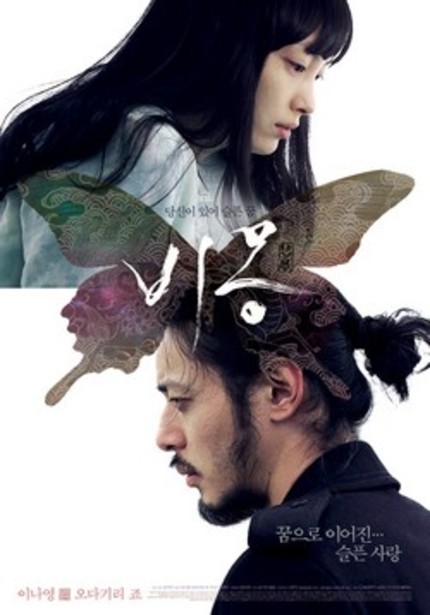NYAFF 09 Review: DREAM

[Our thanks to Ben Umstead for the following review.]
It is no truer than in the medium of cinema that actions speak louder than words. It may take awhile to unravel, to understand the motions at work, and perhaps one may never come to understand. Yet there they are, as real as your very own hands waving in front of your face. We, at the very least, see them, and perhaps can touch them too, though they may in fact not be our own hands.
Kim Ki-duk’s exploration of the power of dreams, the tether between realities, begins with Joe Odigiri’s Jin fleeing a hit and run accident only to wake up moments later in his own bed. Distraught, Jin leaves the house and goes for a drive down a very familiar street to encounter the aftermath of the very accident he caused in his dream. There is the car, the lamppost, the kiosk; everything is the same… He begins to pester the police, insists he was the one who did it. He follows them to a woman’s house where she is arrested for the hit and run. The woman is Ran played by Lee Na-yeong. The police have proof she committed the crime. There, the front of her car is bashed in, and here is a traffic camera photo of her driving the car, fleeing the scene. Jin barges into the police station and begins spouting that this was his dream; Ran, flustered, claims she has been asleep for hours. Soon after a police detective and Jin meet with a dream specialist, who had Ran as a recent patient. She tells them that Ran is a sleepwalker and that in dreamtime she and Jin are linked as one, she will act out whatever he dreams. In dream, Jin’s longing for his ex-girlfriend takes hold of him. Ran, unbeknownst to her, acts out his dreams with her ex, whom she wishes to have nothing to do with. The specialist declares there will be no rest, no balance until Jin and Ran come to peace with this and suggests falling in love with each other. Neither are too happy about this.
It was somewhere in this rather straightforward, yet exposition heavy segment so early on in the film that I began to feel indifferent towards it all. I had no vested emotional or intellectual interest, was only marginally fascinated by the aesthetic. It is not to say this is a bad film or a poorly made one, but there are those that a viewer encounters more often than not that just don’t connect up with the rhythms of said viewer.
Having stated that, perhaps it is too late for me to say this was my first film from Kim. Going in I was vaguely aware of several of his films, totally unfamiliar with his moods, concerns, obsessions or celebrations projected. So I honestly I have no clue if Dream is anything like his other works. In many ways it behaves like a modern stage adaptation of an old folk tale more than a film, giving focus on the bond between the actors on a (figurative) stage; a bond that is present in - perhaps ever more clearly- the strife and anguish that syncopates between Jin and Ran. These are by no means weak performances. Odigiri’s Jin is casual, curious; he prowls the corners of the screen like a coyote, sometimes comes off like a privilege child. Lee’s Ran is a beauty of great unrest and distrust, by the end she is a bleached doll stitched together by dried tears and something of a martyr. As the two futilely come to terms with their predicament nights are drawn out into hazy blues and sleepy oranges. A recurring framing device is putting one or the other behind a curtain or tapestry; sometimes silhouetted, often appearing spectral, transient. The impression it gives is of being trapped or cornered and then…
…half way through, the film opens up, literally breaking away from its boxed in machinations for a brief, emotionally laborious scene set in a wheat field. It is best not to spoil the fascinating dynamics Kim presents here, but as my interest waned this had to be the most radical and successful departure in a film that was becoming very stagnant and restricted. Here was a turning point, and now I was willing to see the film through. Overall I acknowledge the mood he was trying to set, a place of sadness, the sense of isolation through architecture; balance must be struck between these two people, or else one must be destroyed for the sake of the other. I recognize this, yet as the film progressed, diving into extreme realms of pain and malaise, unraveling an ever tearing canvas of (at least technically) beautiful images, spreading broken wings away from the contemporary, confining symbology of squares and towards the freedom of the circle I watched in more and more of a passive, detached state of mind. Critical words can only go so far when I know others will enjoy this movie. Kim is clearly a skilled craftsman and friend to actors. He wears his emotions on his sleeve with a sad sigh and an ethereal, spiritual leaning. Under many circumstances I would respond to such filmmaking. I was able to sit through it no worse for wear, and even under this reviewer’s dimmed eyes the film peddles through fascinating themes, stressing the importance of cycles and rituals, the healing and the torment which blossoms from within them, and the inevitable, uplifting unity found in rebirth.
Review by Ben Umstead
Dream screens as part of the New York Asian Film Festival at the IFC Center, Saturday June 20th, 11:30 AM and Wednesday July 1st, 7:30 PM.







